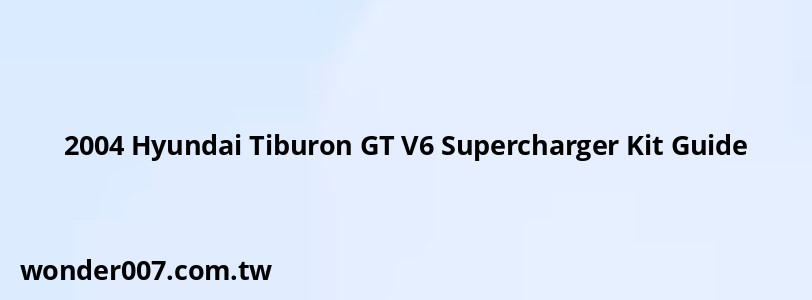2004 Hyundai Tiburon GT V6 Supercharger Kit Guide

The 2004 Hyundai Tiburon GT V6 is a popular choice for performance enthusiasts looking to boost their car's power. Adding a supercharger kit can significantly increase horsepower and torque, transforming your Tiburon into a more potent machine.
Supercharger Options
For the 2004 Tiburon GT V6, there are a few supercharger options available:
- RIPP Supercharger Kit: This is a popular choice, offering significant power gains. The RIPP kit has been reported to produce up to 311 whp at 9 psi of boost.
- Alpine Developments Kit: Another commercially available option specifically designed for the V6 Tiburon.
These kits typically include the supercharger unit, necessary mounting hardware, and often a methanol injection system for charge cooling.
Performance Gains
With a supercharger kit, you can expect substantial performance improvements:
- Horsepower: Increases of 50-65% over stock are common, potentially pushing your Tiburon to over 300 hp.
- Acceleration: The 0-60 mph time could potentially drop from the stock 6.9 seconds to the low 5-second range.
- Top Speed: While the stock top speed is around 140 mph, a supercharged Tiburon could potentially exceed this.
Installation Considerations
Installing a supercharger kit is a complex process that requires significant mechanical knowledge:
- Professional Installation: Unless you're an experienced mechanic, it's recommended to have the kit professionally installed.
- Supporting Modifications: You may need to upgrade your fuel system, exhaust, and potentially strengthen internal engine components.
- Tuning: Proper engine tuning is crucial to ensure optimal performance and reliability.
Cost Considerations
Adding a supercharger to your Tiburon is a significant investment:
- Kit Cost: Expect to pay around $4,000-$5,000 for a quality supercharger kit.
- Installation: Professional installation can add $1,000-$2,000 to the total cost.
- Supporting Mods: Budget an additional $1,000-$2,000 for necessary upgrades like fuel injectors, exhaust, and tuning.
Alternatives
While supercharging is exciting, consider these alternatives:
- Turbocharging: Some enthusiasts prefer turbocharging for potentially higher power gains, though installation can be more complex.
- Bolt-on Mods: Less expensive options like cold air intakes, headers, and exhaust systems can provide modest power gains with less risk.
Before deciding on a supercharger kit, carefully weigh the costs, benefits, and potential risks to your vehicle. While the performance gains can be impressive, they come with increased stress on your engine and drivetrain.
FAQs About 2004 Hyundai Tiburon GT V6 Supercharger Kits
- Will a supercharger void my warranty?
Yes, adding a supercharger will likely void your factory warranty if it's still in effect. - Can my stock engine handle a supercharger?
While the Tiburon's V6 is relatively robust, it's recommended to upgrade internal components for long-term reliability with high boost levels. - How much power can I safely add?
This depends on various factors, but many Tiburon owners aim for 300-350 hp as a reasonable and reliable target.
Related Posts
-
Transmission Fluid Capacity for 2010 Toyota Tundra: Complete Guide
30-01-2025 • 256 views -
Hyundai Santa Fe Limited: Tire Size Guide for 2014 Models
28-01-2025 • 233 views -
Cat C7: Oil Pressure Sensor Location Guide
29-01-2025 • 267 views -
Active Eco: Understanding Hyundai Sonata's Fuel Efficiency Feature
27-01-2025 • 248 views -
Volume Button on Steering Wheel: Troubleshooting Guide
27-01-2025 • 307 views
Latest Posts
-
Are O2 Sensors Covered Under Warranty
01-02-2025 • 426 views -
Rear Brake Caliper Piston Won't Compress
01-02-2025 • 407 views -
2015 Chevy Traverse AC Recharge Port Location
01-02-2025 • 466 views -
How To Turn Off Paddle Shifters Mercedes
01-02-2025 • 436 views -
Power Steering Fluid Leak On Passenger Side
01-02-2025 • 510 views
Popular Posts
-
V12 Engine Costs: What You Need to Know
26-01-2025 • 752 views -
Hino Warning Lights: Understanding Dashboard Alerts
26-01-2025 • 932 views -
Toyota Hiace: Fuel Efficiency Insights for 2025
26-01-2025 • 769 views -
Power Steering and ABS Light On: Causes and Solutions
27-01-2025 • 696 views -
EPC Light: Understanding Causes and Solutions
26-01-2025 • 1135 views
